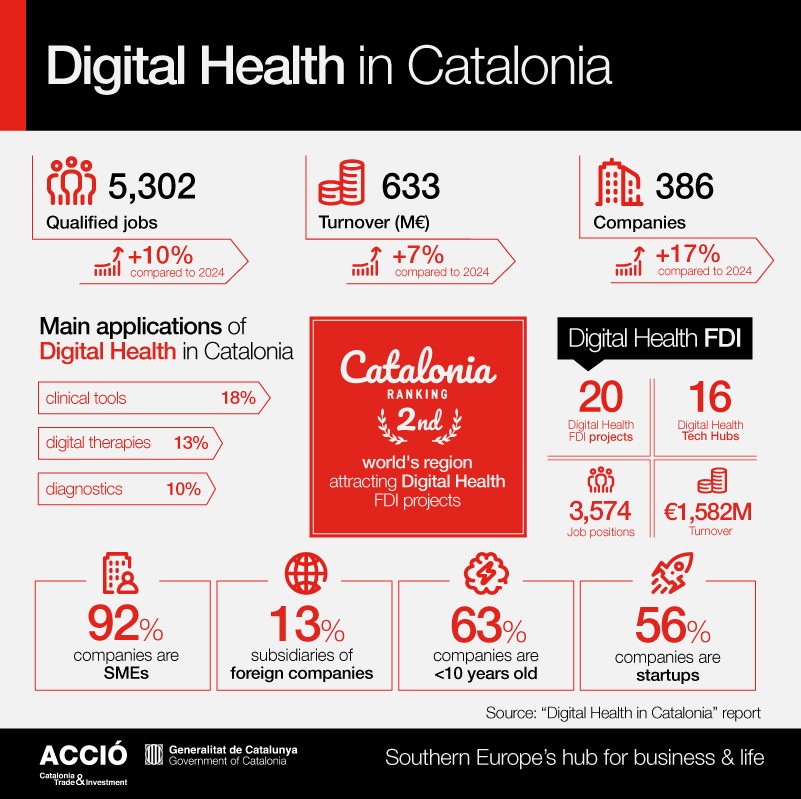“In Barcelona you find an entrepreneurial mindset around healthcare, with pharmaceutical companies, startups and great business schools”
Carlos Nueno, President of International Operations for Teladoc Health
The digital health sector is a rapidly developing and relatively young field, driven by progress in ICT. Currently, 386 companies, most under ten years old, operate in the sector in Catalonia, generating over 5,302 jobs.

The digital health ecosystem in Catalonia is made up of 386 companies—16.6% more than a year ago—with a combined turnover of €633 million (+6.9%) and employing 5,302 people (+10.2%). These are the main findings of a study into the sector prepared by Catalonia Trade & Investment—the business competitiveness agency of the Ministry for Business and Labour—in collaboration with Barcelona Health Hub, Biocat, AQuAS, and the Fundació TIC Salut Social (the latter two under the Ministry of Health).
In the study's context, digital health is defined as the field of knowledge and practice related to the development and use of digital technologies to improve health. This concept is closely linked to others, such as eHealth (electronic health) and mHealth (the use of mobile devices in healthcare).
Search our database to find Catalan companies working in the Digital Health sector.
Most digital health companies in Catalonia are SMEs, representing 92.5% of the total, and 26.9% have an annual turnover of over one million euros. It is a dynamic and growing sector: 63% of companies are under ten years old, and 55.7% are startups. The study also analyzes the business activity of these companies, revealing that the majority (17.9%) focus on developing clinical tools, followed by digital therapies (13%) and diagnostics (9.8%).
It is also a sector closely tied to innovation and emerging technologies. In this respect, the report highlights that 41.5% of companies are developing artificial intelligence solutions for health. The main applications of AI in digital health include the development of clinical and diagnostic tools, support for medical decision-making, and digital therapies, among others.
The report also notes the presence of companies working with immersive technologies (6%) such as virtual and augmented reality, as well as medical robotics (3.1%), which—though still emerging—is revolutionizing surgery and patient care. In addition, Catalan hospitals are increasingly adopting new technologies such as telemedicine, AI, and clinical data analytics, which offer opportunities to optimize processes, empower patients, and transform healthcare delivery models.
“In Barcelona you find an entrepreneurial mindset around healthcare, with pharmaceutical companies, startups and great business schools”
Carlos Nueno, President of International Operations for Teladoc Health


386 companies

€633M in turnover

5,302 employees
Digital health in Catalonia also has a strong international dimension: 15.5% of the companies identified in the study are exporters, while 13% are subsidiaries of foreign companies established in the region.
The report also includes data from the latest edition of the “Tech Hubs Overview,” a study by Catalonia Trade & Investment, Mobile World Capital, and the Barcelona City Council that analyzes foreign tech hubs based in Catalonia. According to the report, 10% of these hubs operate in the health sector, employing a total of 1,369 people.
The study also highlights that Catalonia ranks as the second region in the world for capital invested—behind only Massachusetts (United States)—and fifth in the number of foreign technological investment projects in the health sector over the past five years.
As regards venture capital investment attracted by Catalan startups in the health sector, 2024 saw a 43% increase compared to 2023, reaching €177.7 million. The sector remains among the top three in Catalonia, surpassed only by fintech and travel. Barcelona also ranks as the fifth city in Europe for the number of digital health startup funding rounds closed over the past five years (2020–2024).
The study also analyzes the state of digital health at an international level. It highlights that in 2024, the global digital health market exceeded $171.8 billion, with projected annual growth of 6.9% through 2029. This growth is closely linked to factors such as the adoption of new health technologies, increased public healthcare spending driven by population longevity, and the growing importance of women’s health as a driver of innovation in the industry. The United States leads the global digital health market in terms of revenue, followed by China and Japan.
In Europe, the leading countries are the United Kingdom, Germany, France, Italy, and Spain.
The study also highlights that the transformation of the health sector is being driven by the constant incorporation of disruptive innovations and the convergence of new technologies—from artificial intelligence and big data to wearable devices and smart sensors, as well as immersive technologies, robotics, cybersecurity, supercomputing, and additive manufacturing, among others. The integration of these technologies will enable significant advances in areas such as data analysis for more informed decision-making, the development of personalized medicine, and the promotion of remote care and patient monitoring through telemedicine.
However, the sector also faces challenges such as the need to deploy and protect large digitalized personal data sets, as well as to modernize analog healthcare systems to make them more personalized. These advances will also require the training of specialized talent and the development of a specific legal and regulatory framework to support the sector’s growth.

Get our free report on Digital Health in Catalonia and discover the highlights of this sector in Barcelona-Catalonia.
10 Feb 2025
Success Case: Bayer Barcelona, a Strategic Hub for Innovation and Growth
18 Nov 2024
Success Case: Why Towa Pharmaceutical chose Barcelona for its global headquarters
25 Jun 2024
Success Case: Why Siegfried opened a new Drug Products Development Center in Barcelona-Catalonia
20 Mar 2024
Boehringer Ingelheim, committed to Catalonia's Life Sciences talent